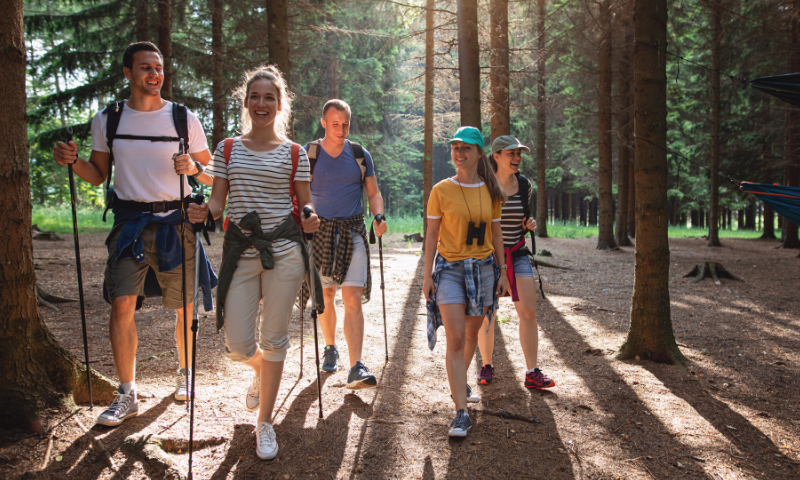The spring and summer months are perfect for lacing up your sneakers and hitting the trails for a hike. One of the greatest rewards of hiking is the impact it has on health. It is a fun, versatile and adventurous activity that is great to add to your regular fitness routine.
Outdoor activities have picked up in popularity in the last several years, especially during the pandemic when many of us were looking to escape from cabin fever. Hiking can vary from a small hike in a local park to an all-day adventure in a much larger state park or mountain range. No matter what type of hike you embark on, the possibilities are endless.
Health Benefits of Hiking
A wide variety of health benefits are associated with hiking. First, being outside has a tremendous impact on your mood and mental health. Studies show that after being outside for just a few minutes, your mood can dramatically improve. There is also a lot to be said about getting some fresh air and avoid the feeling of being “cooped up” in your home. Not to mention the benefits of getting vitamin D from sunshine, which many Americans are deficient in. Vitamin D is important to our skeletal, cardiovascular, neurological and immune systems. Maintaining healthy vitamin D levels protects against disease, optimizes physical performance and improves mental health, as noted above.
What about the physical side to hiking? Hiking is a great workout for your cardiovascular health, endurance and strength because it works a variety of muscle groups. For this reason, it’s a perfect activity to round out your fitness routine. Hiking on different terrains and elevations, incorporating climbing, and increase the duration of your hike can all increase the level of difficulty and burn more calories.
Fuel Up For Your Hike
Depending on the length and intensity of your hike, you may need to fuel up beforehand. Hiking takes a lot of energy and can burn a lot of calories. It’s important to refuel your tank as you continue on your journey. Without proper nutrition, your performance will be affected.
Try to snack every 60-90 minutes to ensure you have the energy to keep going. Snacks that contain both protein and carbohydrates are the best choices. Pack portable snacks that you can easily store in your backpack:
- Protein bars
- Crackers and peanut butter
- Trail mix
- Dried fruit and nuts
- Beef jerky and popcorn
- Granola
- String cheese and pretzels
You also want to ensure you stay hydrated during your hike. Sip on fluids every 10-20 minutes for peak performance and to avoid dehydration. Pack plenty of water or drinks with electrolytes if you expect to be out on the trails for a long time.
What’s in Your Backpack?
What do you need for a day of hiking? It’s important to be prepared!
- Extra clothing: Temperatures and weather patterns can change, so it’s important to layer. Pack an extra shirt and sweatshirt/jacket if the temps get cooler or it starts to rain. Throw in an extra pair of socks in case you end up hiking through water.
- First aid: Band-aids, antibiotic ointment and bandages are good to have on-hand in case of an injury.
- Map: If you’re on a longer hike, a map can prevent you from getting lost, especially if you decide to go off-trail.
- Bug spray and sunscreen: These may be especially helpful during the hot and muggy months. Consider small or travel size to lighten your load.
- Snacks: As we know, snacks are important. Bring extra in case your hike extends.
Developing the Perfect Hike For You
One of the best parts about hiking is the flexibility and adaptability. You can make your hike whatever you want it to look like based on your fitness level and goals.
If you’re looking for a more challenging walk, you have several options. First, look for walks that have more elevation, steeper trails, and those that are marked as more difficult. You can research many trails online beforehand. You can also add weight to the challenge. Choose to carry a heavier backpack or use small hand weights for added resistance. Picking up the pace can increase the intensity of your hike as well.
It’s also possible to make your hike less difficult. Search for easier trails in more heavily trafficked parks or on paved walkways. Limit those trails with high elevation and difficult climbs. Carry a light backpack and go at your own pace. Hiking isn’t a race! Cherish every step you take and embrace all the ways your body is supporting you as you move through nature.
Enjoy some fresh air and get moving!






